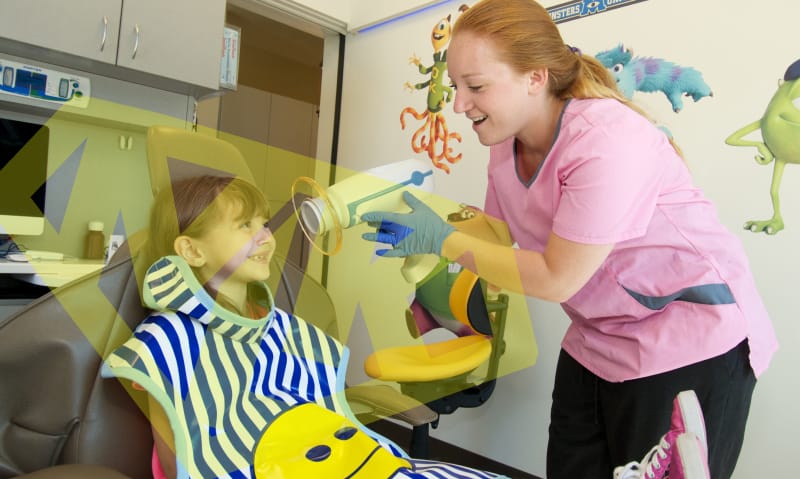My Child Has a Cavity. Now What?

Cavities need to be treated quickly.
When you take your child to the dentist, the news that they have a cavity is probably the last thing you want to hear. Even if your child is old enough to brush their own teeth, you might find yourself feeling responsible for the cavity—especially if it’s their first one. Guiding your child through their first cavity can sound incredibly intimidating, especially if you’re not the biggest fan of the dentist yourself, but it’s necessary. Treating your child’s cavity quickly is the best way to ensure it doesn’t worsen and begin causing your child pain; this is true even in baby teeth, which play an essential role in the healthy development of your child’s adult teeth. Our pediatric dentist office deals with cavities on a daily basis, so we’ve put together a basic guideline to help you figure out the best way to prepare your child for their treatment.
Don’t panic.
When you learn that your child has a cavity, try to stay calm instead of launching yourself into panic mode. The presence of a cavity isn’t a reflection of your parenting skills, your love for your child, or an indication that you’re not caring for them well enough. Although we wish they weren’t, cavities are incredibly common, ranking in as the number one chronic infectious disease in American children. They’re so rampant that 60% of children have had at least one cavity by the time they’re five years old.
While there are steps you can take to reduce the likelihood your child will get cavities, such as a balanced diet and great oral hygiene, there’s no way to absolutely guarantee your child won’t get a cavity. This is particularly true of baby teeth, which have a thinner layer of protective enamel and are more vulnerable to decay. Even dentists’ kids get cavities sometimes, so don’t worry too much if your child gets one! It’s just a cavity—and when it comes right down to it, cavities are easy to treat.
Schedule an appointment for an evaluation.
If you haven’t gotten to speak with Dr. Mo, Dr. G, or Dr. Z about your child’s treatment plan yet, it’s wise to schedule an evaluation as soon as possible. During this appointment, you can speak with your child’s pediatric dentist about the extent of the decay, potential treatment options, and the best way to keep your child calm and comfortable throughout the procedure. You should also update your kid’s dentist on your child’s medical history and their current list of medications.
Discuss the benefits of laser dentistry for kids.
At Must Love Kids, we use advanced technology like dental lasers to provide better results and a less stressful experience for your child. Our LiteTouch dental lasers remove cavities without the scary vibrations or loud noises that traditional dental drills produce; the laser only makes a slight tingling sound and is nearly painless, producing a sensation similar to water spraying into your child’s mouth and almost always eliminating the need for numbing shots. The laser is precise, allowing your kid’s dentist to work quickly and remove less of the tooth than they’d have to with a drill, and it helps your child heal faster because it reduces inflammation and sterilizes as it works.
If you’ve never experienced dental lasers before, you may want to take some time during your child’s evaluation to ask your child’s pediatric dentist about it. We want you to be completely comfortable with the treatment your child is receiving, so we’re glad to answer all of your questions!
Evaluate your own anxieties.
Your child will likely be much more scared of the procedure if they realize you’re nervous about it, so you need to evaluate your own concerns and anxieties and begin dealing with them before you speak to your child about their treatment. This will allow you to talk to your child about their procedure without passing your own anxiety onto them.
Talk to your child about treating their cavity.
Not knowing what to expect from the appointment to fill their cavity can make your child much more anxious about it, so prepare your child by explaining what their dentist will do. If you need any help with this, check out our wording on our website or talk to us! How you’ll go about explaining this will depend on the age and personality of your child, but generally, you should make an effort to use positive terms so it doesn’t sound so scary. For younger kids, you may want to make the procedure sound almost like an adventure—talk about how the dentist will save their teeth from invading sugar bugs or try reading books about cavities and visiting the dentist. If your child is interested in science, sci-fi, or math, you may want to talk about the dental lasers that will be used during their treatment; they might even be genuinely excited for the chance to experience a real laser.
Examine your habits and consider making changes.
Although cavities are incredibly common, they don’t have to be common for your child. One cavity can happen no matter how careful you are, but it’s a good reminder to examine your family’s habits and decide if you need to make a few changes. The bacteria that cause cavities can be spread from one person to another, so make sure everyone in your family goes to the dentist twice a year for an evaluation and practices tooth-healthy habits on a daily basis; this means sticking to a great oral hygiene routine, eating a balanced diet, and drinking plenty of water between meals.
Discovering that your child has a cavity can be overwhelming at first, but it’s nothing to be ashamed of—cavities are very common and incredibly easy to treat. The best thing you can do for your child is stay calm and positive, so you can prepare them for a quick, easy, and painless treatment at our Vancouver office.